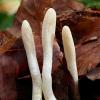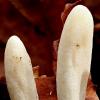
28-02-2026 14:43
A new refrence desired :Svanidze, T.V. (1984) Novy

01-03-2026 18:46
 Robin Isaksson
Robin Isaksson
Hi! This species i se from time to time in the

27-02-2026 17:51
 Michel Hairaud
Michel Hairaud
Bonjour, Quelqu'un peut il me donner un conseil p

27-02-2026 16:17
 Mathias Hass
Mathias Hass
Hi, Found this on Betula, rather fresh fallen twi

01-03-2026 18:02
 Francois Guay
Francois Guay
I found this mystery Helotiales on an incubated le

01-03-2026 14:10
 Antonio Couceiro
Antonio Couceiro
Hola, me gustaria conocer opiniones sobre este tem
Found on Friday, in the middle of an isolated deciduous area, (mainly Beech & Birch), of a moorland Spruce plantation in north west England.
Around 20 to 30 individual fruitbodies varying in size from 25mm tall to 50mm tall, scattered in an area approximately 10 metres across, on rotting Beech leaf litter, in the above mentioned deciduous part of the forest.
Ground conditions very damp, consisting of mossy hummocks with several inches of rotting Beech leaf debris collected in the troughs between the hummocks.
They have the general looks of Cordyceps, but were definitely attached directly to the Beech leaves.
No signs whatsoever that they could have been/previously had been growing from any sort of dead insect or pupa.
They have a faintly spotted head, with a noticeable delineation between the head and the plain (slightly floccose) white stalk below.
I left the fruitbodies sitting on a microscope slide overnight, and they produced a very substantial white spore drop.
Under the microscope, the majority of spores (in the thousands) were found to be averaging 2.1µ (and almost spherical in shape).
However, there were also quite large numbers of spores (in the hundreds) which were ovoid, averaging 3.9µ in length x 2.1µ in diameter.
No discernible oil drops or other internal features observed in the spores. (In water and also in lactophenol cotton blue, which was readily taken up).
The asci were 16-spored, ranging between 76µ and 89µ in length x 2.5µ to 3µ width. (Average of the measured asci being 85µ x 3µ).
Unfortunately, my microscope camera software has ceased to work following a recent Windows 10 update, and so I cannot include microphotographs.
I would greatly appreciate any suggestions for species / genus.
Kind regards,
Mike Valentine.

Many many thanks for your reply. it is much appreciated.
You are undoubtedly correct!
Without the help of AscoFrance, I doubt that I would have been able to resolve this query!
Best regards,
Michael valentine
I will make contact with Royal Botanic Gardens, Kew Fungarium, and ask if they would like to have the sample fruitbodies sent to them in order to authenticate this find as a UK record.
The samples were dried and sent off to Dr Paul Cannon.
I am greatly indebted to Paul, who has carried out further microscopy etc, and has now confirmed that the find was indeed Trichoderma leucopus.
The find has been accepted as the first verified record for Great Britain and Ireland, and the voucher material etc. will be deposited at Kew Fungarium in due course.
Paul has created a FRDBI species page, (with various micro-photographs and descriptive information etc.), for the record here: -
https://fungi.myspecies.info/all-fungi/trichoderma-leucopus


